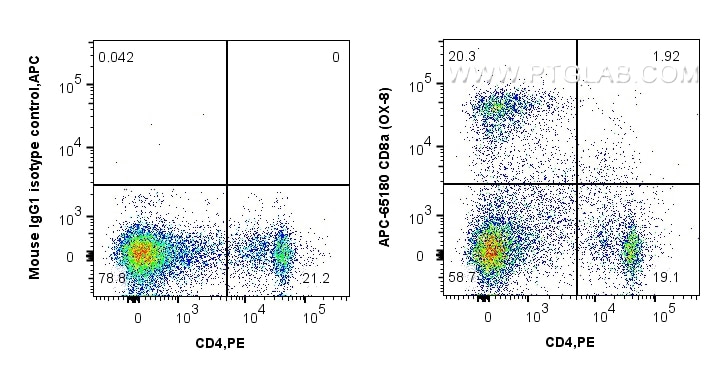CD8a Monoklonaler Antikörper
CD8a Monoklonal Antikörper für FC
Wirt / Isotyp
Maus / IgG1, kappa
Getestete Reaktivität
Ratte
Anwendung
FC
Konjugation
APC Fluorescent Dye
CloneNo.
OX-8
Kat-Nr. : APC-65180
Synonyme
Galerie der Validierungsdaten
Geprüfte Anwendungen
| Erfolgreiche Detektion in FC | Ratten-Splenozyten |
Empfohlene Verdünnung
| Anwendung | Verdünnung |
|---|---|
| This reagent has been tested for flow cytometric analysis. It is recommended that this reagent should be titrated in each testing system to obtain optimal results. | |
| Sample-dependent, check data in validation data gallery | |
Produktinformation
APC-65180 bindet in FC CD8a und zeigt Reaktivität mit Ratten
| Getestete Reaktivität | Ratte |
| Wirt / Isotyp | Maus / IgG1, kappa |
| Klonalität | Monoklonal |
| Typ | Antikörper |
| Immunogen | k.A. |
| Vollständiger Name | CD8a molecule |
| GenBank-Zugangsnummer | BC088126 |
| Gene symbol | Cd8a |
| Gene ID (NCBI) | 24930 |
| Konjugation | APC Fluorescent Dye |
| Excitation/Emission maxima wavelengths | 650 nm / 660 nm |
| Form | Liquid |
| Reinigungsmethode | Mit Protein-A-Affinitätschromatographie gereinigt |
| Lagerungspuffer | PBS with 0.1% sodium azide and 0.5% BSA. |
| Lagerungsbedingungen | Store at 2-8°C. Avoid exposure to light. Stable for one year after shipment. |
Hintergrundinformationen
CD8 is a transmembrane glycoprotein composed of two disulfide-linked chains. It can be present as a homodimer of CD8α or as a heterodimer of CD8α and CD8β (PMID: 3264320; 8253791). CD8 is found on most thymocytes. The majority of class I-restricted T cells express mostly the CD8αβ heterodimer while CD8αα homodimers alone have been found on some gut intraepithelial T cells, on some T cell receptor (TCR) γδ T cells and NK cells (PMID: 2111591; 1831127; 8420975). CD8 acts as a co-receptor that binds to MHC class-I and participates in cytotoxic T-cell activation (PMID: 8499079). During T cell development, CD8 is required for positive selection of CD4-/CD8+ T cells (PMID: 1968084).
Protokolle
| Produktspezifische Protokolle | |
|---|---|
| FC protocol for APC CD8a antibody APC-65180 | Protokoll herunterladen |
| Standard-Protokolle | |
|---|---|
| Klicken Sie hier, um unsere Standardprotokolle anzuzeigen |


